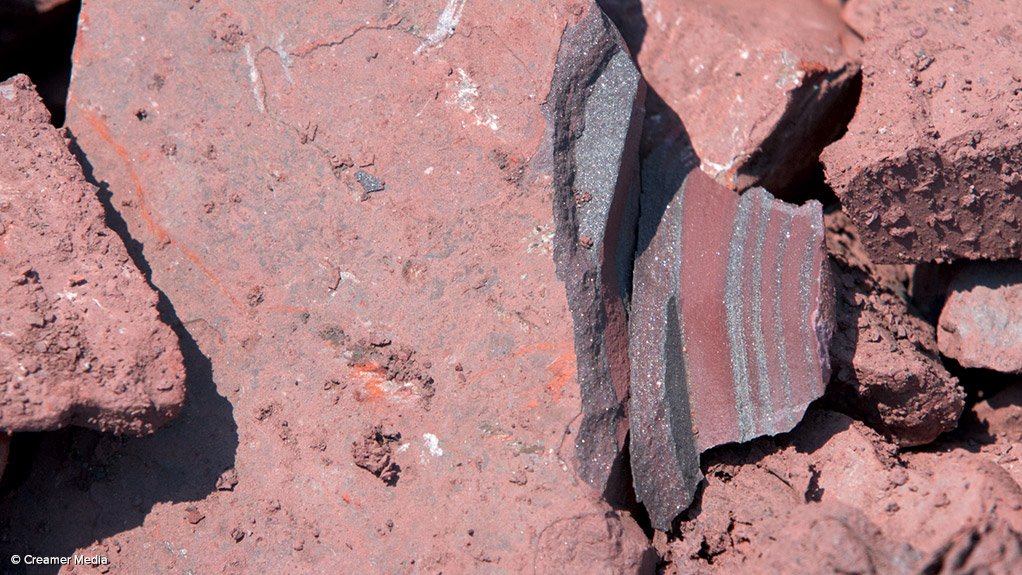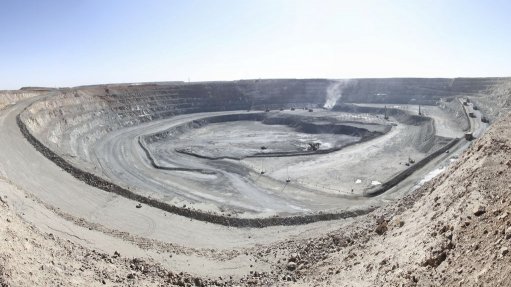No more plundering: Can Africa take control in green mineral rush?


South Africa is an important supplier of manganese – just one of the critical minerals needed for global decarbonisation efforts.
Photo by Creamer Media
From Zimbabwe's lithium-rich rocks to the Democratic Republic of Congo's cobalt, minerals critical for clean energy technologies are increasingly in demand from Africa's trade partners as part of the global green transition from planet-warming fossil fuels.
Yet on a continent long blighted by the so-called "resource curse" - whereby nations rich in oil or gold, for example, have failed to convert this into wider prosperity - governments have increasingly restricted or banned mineral exports in recent years in a bid to boost processing and retain more of the gains.
This strategy could backfire, however, by deterring foreign investment, several analysts said.
The European Union (EU), meanwhile, has voiced concern about growing export restrictions in Africa on critical minerals used in renewable and low-carbon technologies - from batteries for electric vehicles (EVs) to wind turbines.
More than a dozen African nations - including Democratic Republic of Congo (DRC), Nigeria and Namibia - have restricted such exports intermittently or banned them outright, according to research published in May by the Africa Development Forum.
Former Nigerian mines and steel development minister Olamilekan Adegbite, who spearheaded a raw-ore export ban in the country in 2022, said African nations were calling for an end to the "plundering (of) the continent for raw materials".
Despite being a major crude oil producer, Nigeria is heavily dependent on imports from overseas refineries. Adegbite said the ore ban, which incentivises local processing or refining before exporting, aimed to avoid the same issue in the mining sector.
"Bring the industries to Africa so that our people can be employed," said Adegbite.
As demand grows for such minerals for the energy transition, so are calls for export controls or bans in Africa - with the aim of moving beyond just mining and bringing more of the supply chain - and ensuing value and profits - within the continent.
Between 2017 and 2022, the energy sector was the main driver behind a tripling of demand for lithium, while demand for cobalt grew by 70% and nickel rose by 40%, according to a report released in July by the International Energy Agency (IEA).
But analysts at the Natural Resource Governance Institute (NRGI), a non-profit policy institute, warned that blanket bans on critical mineral exports alone would not suffice to support the continent's much-needed economic growth.
Without mineral processing infrastructure such as a battery value chain and strong frameworks to ensure tax revenues are used effectively, African nations could put off trade partners and limit investment into the mining sector, the analysts said.
"It's an understandable strategy, but it's a risky one," said Thomas Scurfield, a senior Africa economic analyst at NRGI.
"I think it has to be backed up by analysis of the specific mineral ... and then a strategy of how to actually make it work (for local benefit)," he told the Thomson Reuters Foundation.
CAN AFRICA SHAKE 'RESOURCE CURSE' WITH CRITICAL MINERALS?
Many mineral-rich African nations are known for experiencing a "resource curse", with bad governance linked to "corruption, environmental degradation, (and) human rights abuses", said Silas Olang, NRGI's Africa energy transition advisor.
But there is now a chance to buck the trend on the continent as the world "turns an eye on Africa's minerals", Olang added.
Africa has 30% of the world's mineral reserves, many of which are needed for the green transition, including cobalt in DRC, manganese in South Africa and lithium in Zimbabwe, the South African Institute of International Affairs (SAIIA) said.
Minerals like cobalt, lithium and manganese are vital for battery performance, copper is integral for all electricity-related tech, while rare earth elements such as neodymium are used in permanent magnets that power EV motors and turbines.
DRC has banned exports of copper and cobalt concentrate intermittently since 2013 to encourage domestic processing, but it has issued regular waivers to the ban.
For export bans to really benefit African nations, however, governments would have to shift processing power - and ownership of it - locally, and make use of their renewable energy capacity to power it too, according to the NRGI analysts.
Only a tiny fraction of Africa's mineral reserves are processed on the continent, whereas China - the global leader in mineral processing - refines 73% of all cobalt, 40% of copper, 59% of lithium and 67% of nickel, said the SAIIA, a think tank.
Franklin Cudjoe, CEO of policy think tank Imani Africa, said enforcing blanket bans on exports without the local capacity and funding to process critical minerals was counterproductive.
He highlighted a 2022 deal between DRC and Zambia to set up special economic zones for EVs and batteries in both nations - backed by private and public funding - describing it as a model other African governments could explore in the shift from exporting to domestic processing.
The African Union and other regional bodies are developing an African Green Minerals Strategy, which aims to improve mining regulation and institutions, and build a more attractive investment environment, among other objectives.
"This is a piece of paper, but it is a very important one... the important next step is how to translate that strategy into a practical one," said Olang of NRGI, emphasising the importance of regional collaboration between African nations.
CONCERNS FROM THE EUROPEAN UNION
Resource export bans by African nations have sparked concern in the EU as it seeks alternative mineral trade partners to China and Russia, in the race to become climate-neutral by 2050.
An EU commission spokesperson said recent moves by Namibia to ban some exports of critical minerals may violate bilateral trade instruments and World Trade Organisation (WTO) law.
In June, the Namibian government banned the export of unprocessed lithium and other minerals, about eight months after signing a memorandum of understanding with the EU to develop its supplies of rare earth minerals, as well as renewable hydrogen.
The EU intends to follow developments closely and to have "constructive dialogue" on finalising the EU-Namibia partnership on sustainable raw materials, the commission spokesperson said.
In response to the risk of supply disruption, the EU unveiled in March its Critical Raw Materials Act (CRMA), which aims to make the bloc less dependent on single suppliers by boosting domestic mineral industries in countries such as DRC.
The policy offers the EU an opportunity to work hand-in-hand with African countries on a more equal footing, said German EU lawmaker Nicola Beer, who is in charge of steering the bill through the legislative process.
"The EU should not act as moral authority, but offer interested countries a long-term raw materials and value chain partnership that offers more than unilaterally profitable agreements, such as those pursued by China or Russia," she said.
African nations should also be asking trade partners for help to improve tax policies and collection to meet welfare needs and fund renewable energy, said Scurfield of NRGI.
Ultimately, local investment is more important than trying to compete with China, according to Olang.
"Africa should not be bothered about China's processing," he said. "We should be bothered about how we utilise our minerals for the benefit of our people."
Comments
Press Office
Announcements
What's On
Subscribe to improve your user experience...
Option 1 (equivalent of R125 a month):
Receive a weekly copy of Creamer Media's Engineering News & Mining Weekly magazine
(print copy for those in South Africa and e-magazine for those outside of South Africa)
Receive daily email newsletters
Access to full search results
Access archive of magazine back copies
Access to Projects in Progress
Access to ONE Research Report of your choice in PDF format
Option 2 (equivalent of R375 a month):
All benefits from Option 1
PLUS
Access to Creamer Media's Research Channel Africa for ALL Research Reports, in PDF format, on various industrial and mining sectors
including Electricity; Water; Energy Transition; Hydrogen; Roads, Rail and Ports; Coal; Gold; Platinum; Battery Metals; etc.
Already a subscriber?
Forgotten your password?
Receive weekly copy of Creamer Media's Engineering News & Mining Weekly magazine (print copy for those in South Africa and e-magazine for those outside of South Africa)
➕
Recieve daily email newsletters
➕
Access to full search results
➕
Access archive of magazine back copies
➕
Access to Projects in Progress
➕
Access to ONE Research Report of your choice in PDF format
RESEARCH CHANNEL AFRICA
R4500 (equivalent of R375 a month)
SUBSCRIBEAll benefits from Option 1
➕
Access to Creamer Media's Research Channel Africa for ALL Research Reports on various industrial and mining sectors, in PDF format, including on:
Electricity
➕
Water
➕
Energy Transition
➕
Hydrogen
➕
Roads, Rail and Ports
➕
Coal
➕
Gold
➕
Platinum
➕
Battery Metals
➕
etc.
Receive all benefits from Option 1 or Option 2 delivered to numerous people at your company
➕
Multiple User names and Passwords for simultaneous log-ins
➕
Intranet integration access to all in your organisation



















